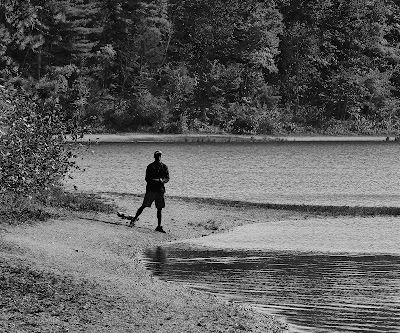Ex 16:2-4, 12-15
Ps 78:3-4, 23-24 25, 54
Jn 6:24-35
It is no accident that the first reading from Exodus is paired with the Gospel narrative from John. They are connected through the words of one of the most beautiful hymns of the Catholic Church. Will come back to that a bit later.
The following entry on bread appears in Jesuit Xavier Leon-Dufour's Dictionary of Biblical Theology: "Bread, a gift of God, is for man the source of strength, a means of subsisting so essential that a lack of bread is a lack of everything. . . .In the (Our Father) bread seems to sum up all the gifts that are necessary for us."
The idea of bread as essential and a symbol of all that is necessary has carried forward into American English, or at least American slang. When a guy says, "Man, I need some serious bread by tomorrow" he is not referring to slices of whole wheat but to money. Over the past weeks the readings at daily Mass from Exodus told of the people's departure from Egypt, the signs that God wrought to assist that departure, how God protected them, gave them the gift of the ten commandments, and fed them with bread from heaven to sustain them on the journey. The dramatic high point in this reading occurs when God--in response to another series of whiny complaints from the people he had freed from slavery-- tells Moses what he is going to do, "So that you may know that, I, the Lord, am your God,".
The Gospel narrative reflects back to the multiplication of loaves and fish that from earlier in this sixth chapter of John. The people were seeking Jesus. But their motive for seeking Him was from a misunderstanding of Jesus and the miracle he performed. As Jesus noted, they were seeking him because he had fed them well. They weren't seeking him because of his message of the Kingdom of God. They wanted to find Jesus because their physical hunger was satisfied with no effort on their part. Perhaps they wanted more to take for the trip home. Or they wanted the recipe. Or to put Jesus on retainer as community chef. The crowed responded only to the superficial without attention to Jesus message and its meaning.
In the Gospel the people made an impertinent demand. "What sign can you do that we may believe in you? Our ancestors ate manna. (Moses) gave them bread from heaven to eat." Jesus responded, "It was not Moses who gave bread from heaven. . . The bread of God is that which comes down from heaven and gives life to the world." In response to their further plea to "give us this bread always: Jesus made an important theological statement that we must always remember. “I am the bread of life; whoever comes to me will never hunger, and whoever believes in me will never thirst.”
This does not mean that we won't have to go to Stop 'n Shop at annoyingly frequent intervals, or, like the Samaritan woman at the well who misunderstood what Jesus told her, that we won't have to go to the well daily for our water. Jesus is telling us that He is the true manna, the true bread from heaven, sent by the Father to nourish us always.
The ancient hymn that connects the first reading and the Gospel is: Panis Angelicus. It translates as Bread of Angels. I chose to have it sung at my first Mass the day after ordination and again the following week at Mass in my hometown. Back when Pope Benedict visited the U.S. I distributed communion at the Papal Mass held in the baseball stadium. Just as I returned to my seat, the orchestra played the intro to Panis Angelicus. And then the voice rang out: Placido Domingo. I'm an opera lover and a particular fan of Doming, much more so than Paarotti. Had I been found dead in my seat afterwards it would have been with a beatific smile on my face.
There are many English translations of the Latin lyrics. Some of them are dreadful bouncy rhyming iambic pentameter while others, though not perfectly rhymed, convey the message of the lyricist, St. Thomas Aquinas, much more effectively.
"The bread of the angels
became the bread of man;
the bread of heaven
was given visible form.
O wonder of wonders,
The Body of Christ
nourishes the poorest
and most humble of people."
In just a few moments, you will hear the words of consecration over the bread. Listen carefully. Let the words sink into your soul. Let them remain there for the rest of this day. May they dwell there for the rest of your lives.
__________________________________________________
Some random photos from Taiwan, one of my favorite places on earth.
An old Japanese-style temple in Chang-hwa.
+ Fr. Jack, SJ, MD

























